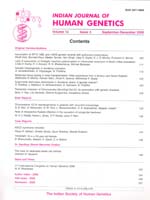
|
Indian Journal of Human Genetics
Medknow Publications on behalf of Indian Society of Human Genetics
ISSN: 0971-6866
EISSN: 0971-6866
Vol. 12, No. 1, 2006, pp. 17-22
|
 Bioline Code: hg06004
Bioline Code: hg06004
Full paper language: English
Document type: Research Article
Document available free of charge
|
|
|
Indian Journal of Human Genetics, Vol. 12, No. 1, 2006, pp. 17-22
| en |
Fragile X screening for FRAXA and FRAXE mutations using PCR based studies: Results of a five year study
Chowdhury MadhumitaRoy, Kabra Madhulika, Sharma Deepti, Singh Deepika, Dabral Anjali, Thelma BK, Kalra Veena
Abstract
Background: Fragile X syndrome is the most common cause of inherited X-linked mental retardation. It is due to a mutation in a gene on X chromosome leading to hyper-expansion of a trinucleotide repeat sequence. The two most common Fragile sites with clinical significance are FRAXA at Xq27.3 comprising CGG repeat and a more distal FRAXE associated with amplification of a GCC repeat, located at Xq28. The frequency of occurrence of Fragile X syndrome is estimated to be 1/4000 male births. Screening of referrals for the mutations associated with the Fragile X syndrome constitutes a significant workload in many genetic laboratories.
Aims: The aim of the present study was to establish the use of PCR based simple and rapid method of initial screening of samples, so that only a minority of samples tested positive with the above methods need to be screened by Southern blotting which is more time consuming and involves use of radioactive material.
Materials and Methods: Study includes 294 patients with mental retardation. DNA extracted from blood was used for simultaneous amplification of the triplet repeat sequences at the FRAXA and FRAXE loci. Secondly samples from females were analyzed for heterozygosity of normal FRAXA allele. For confirmation of the presence of an expanded FRAXA allele in all the male positive cases, Southern blot hybridization was carried out. PCR based assay was done to detect methylation of the CpG island upstream of the FMR-1 gene.
Results: Out of the 294 cases 23 (7.8%) were found to be having full mutation (FM) for FRAXA (21 males, 1 female & 1 male with mosaic FM/PM) and 13 females as having premutation (PM). All these 36 cases were confirmed by Southern blotting using appropriate probes. Among the females the heterozygosity for FRAXA allele was found to be 46%.
Conclusion: Non-radioactive PCR methods are efficient and rapid test for intial screening of samples for the presence of FRAXA and FRAXE mutations. Since a large majority of referrals do not have Fragile X, this economical and reliable method reduces the number of samples needing Southern blotting.
Keywords
Fragile X syndrome, trinucleotide repeat, methylation, pre-mutation, full mutation, heterozygosity, polymerase chain reaction.
|
| |
© Copyright 2006 Indian Journal of Human Genetics.
Alternative site location: http://www.ijhg.com/
|
|
